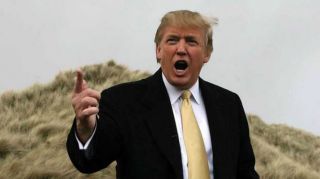
Like many people watching the unfolding campaign, I have been somewhat surprised by the initial appeal of Donald Trump’s rhetoric and style. Some colleagues and friends tell me that they cannot understand how someone who seems so bombastic, misogynistic, and contemptuous could become so popular. But it may actually be that in addition to his “celebrity” status he has tapped into some fears and concerns that appeal to a sizeable minority of people. It would be easy—and, perhaps, satisfying—to just dismiss him as a candidate that will inevitably fail.
But as a psychologist I thought it might be wiser to try to analyze what the appeal is and why it seems to be working at the present moment.
Populism and Nativism
If we can identify any “program” that he is advocating it sounds a lot like a combination of populism, nationalism, and charismatic rhetoric. He plays up the anger and frustration that millions of people experience in regard to illegal immigration, perceived weakness and indecisiveness in political leadership, and perceived lack of respect for American leadership. He offers a “nativist” perspective that views immigrants and foreign leaders as a threat to America. Some years ago historian John Higham published Strangers in the Land: Patterns of American Nativism, 1860-1925 in which he described the nativist movements that arose between 1860 and 1920 during economic recessions when immigrants were viewed as a threat to native-born Americans. Trump is playing on an old formula of nativist prejudice and fear of immigration and contempt for foreign leaders and countries.
He is also playing on emotional appeals, rather than laying out a specific plan of action that can be examined in regard to evidence and logic. This has an advantage as a propaganda tool in that he is able to stay on the emotional level, dismiss requests for evidence, and utilize the charisma that he has from his celebrity status and apparent confidence.
Let’s see if we can develop a “Trump Formula”. What are the ingredients of his emotional campaign that appeals to some people? And how is this similar to what we have seen at other times in history?
The Trump Formula
1.Create an enemy
One of the most effective ways to gain emotional support as a political leader is to identify an enemy that is viewed as hostile, undermining or manipulative. This is a tactic that Putin has used effectively by viewing the West—especially America—as an enemy surrounding and threatening Mother Russia. It underlies the initial appeal of the nationalist, anti-immigrant party in the UK led by Nigel Farage—UKIP. And it reflects the same emphasis on “the enemy” of neo-fascist parties in Austria, France and elsewhere. I am not implying that Trump is a fascist. It’s the emphasis on an enemy that can be dangerous. If Trump is able to convince people that the enemy lies within---including immigrants, politicians, and weak leaders— he can play on anxiety and target others for attack. Enemies are important in propaganda wars because they raise the emotional level and they promise a solution. The solution is to attack and eliminate the enemy.
2.Play on fear
Related to the idea of an enemy is the importance of raising the fear level. Trump is like a lot of populist leaders in the past who emphasize the fear that America is losing ground, that we are being invaded by dangerous people, and we are threatened by highly sophisticated enemies abroad. Trump would have us believe that our economy is collapsing, that all the jobs are disappearing (even if the unemployment rate has fallen), and that things will get worse. If you create an enemy and you raise the fear level you establish the need for THE GREAT LEADER.
3.Emphasize humiliation
The one thing that might even be worse than fear is the sense of humiliation. So Trump plays up the idea that we have been humiliated and manipulated by the Chinese, Russians, and Mexicans. When people are humiliated they get angry and when they get angry they attack. As Yale historian Donald Kagan points out in his classic book, On the Origins of War: And the Preservation of Peace, fear and humiliation—along with the opportunity for gain--- are key ingredients for war. We can see this in the response of the German people under the Nazi regime where the belief was that they had been humiliated by the peace treaty after the First World War, that the Versailles Treaty added to the humiliation, and that the enemies that needed to be attacked were the Jews, communists, and the Western democracies. Again, the antidote to humiliation is a strong leader who will humiliate others. This is one reason why Trump’s bullying behavior has an appeal. People view this as evidence that he is tough enough to “take on” those who have humiliated us.
4.Talk about strength
Rather than talk about specific policies Trump talks about strength, energy, and toughness. He labels his opponents as losers, weak and lacking energy. If the narrative is that our problems are due to the fact that we don’t have a tough leader then acting like a bully, humiliating people, and promising to force the Mexicans to build a fence all play into the promises that he is making.
5.Describe catastrophes
Just listen to the political rhetoric in any campaign and you would think that we are at the end of days. Present conditions are described as a disaster, awful, and falling apart. It’s the worst of times. This raises the fear level, plays up humiliation and necessitates—from his view—the need for THE GREAT LEADER.
6.Take everything personally
If you want to emphasize the importance of THE GREAT LEADER it is essential that Trump personalize the campaign and view any disagreements—or even questions—as insults that require an attack and humiliation of the “opponent”. Any bully views any inconvenience as a provocation that requires attack. Indeed, like a lot of bullies in high school his self-esteem probably goes up when he attacks someone he views as critical. So, he humiliates Rand Paul by calling attention to the fact that he wears a hearing aid, he attacks Megan Kelly as being in a bad mood because she is menstruating, and he attacks Jeb Bush because he lacks energy. All of the attacks reflect the egocentric view that it is all about him. That’s what THE GREAT LEADER has to think.
7.Don't offer details, just generalities
If you stick with the game of THE GREAT LEADER you are not required to offer details, just generalities. He will fix everything, he promises, you have to believe him. His view is that details and generalities are an after-thought, only used by those who lack flexibility in leadership. He doesn’t want to be tied down to a plan. He makes it up as he goes along. This keeps the focus on the emotional appeals of fear, humiliation, the enemy that threatens us, and the weakness and incompetence of all around him.
Let’s watch Trump over the next two months and see how his propaganda campaign plays out. Keep in mind that this is a man who measures people by how much money they have----he repeatedly tells us he has 10 Billion dollars. That means that all of us are losers. This is the man who views Mexican immigrants as murderers and rapists even though an article in the Wall Street Journal indicates that immigrants have lower rates of incarceration.
When people are anxious and afraid they turn to someone who promises certainty, solutions, and strength. This is a dangerous time to choose leaders who play to these emotional concerns.




